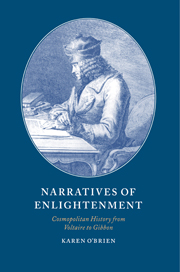Book contents
- Frontmatter
- Contents
- Acknowledgements and author's
- 1 Introduction: cosmopolitanism, narrative, history
- 2 Voltaire's neoclassical poetics of history
- 3 European contexts in Hume's History of England
- 4 William Robertson to the rescue of Scottish history
- 5 Robertson on the triumph of Europe and its empires
- 6 Emulation and revival: Gibbon's Decline and Fall of the Roman Empire
- 7 David Ramsay's sceptical history of the American Revolution
- Afterword
- Bibliography
- Index
- CAMBRIDGE STUDIES IN EIGHTEENTH-CENTURY ENGLISH LITERATURE AND THOUGHT
4 - William Robertson to the rescue of Scottish history
Published online by Cambridge University Press: 28 October 2009
- Frontmatter
- Contents
- Acknowledgements and author's
- 1 Introduction: cosmopolitanism, narrative, history
- 2 Voltaire's neoclassical poetics of history
- 3 European contexts in Hume's History of England
- 4 William Robertson to the rescue of Scottish history
- 5 Robertson on the triumph of Europe and its empires
- 6 Emulation and revival: Gibbon's Decline and Fall of the Roman Empire
- 7 David Ramsay's sceptical history of the American Revolution
- Afterword
- Bibliography
- Index
- CAMBRIDGE STUDIES IN EIGHTEENTH-CENTURY ENGLISH LITERATURE AND THOUGHT
Summary
William Robertson enjoyed, in his day and for much of the nineteenth century, a reputation as a historian little inferior to Hume. Recent scholarship has gone some way towards reinstating Robertson as a figure of central importance both to the cultural life of eighteenth-century Scotland and to the historical enterprises of Enlightenment Europe. The coincidence of these two spheres of Robertson's importance is not accidental, but helps to explain the nature and former scale of his reputation. By the mideighteenth century, when Robertson first ventured into the historical field, narrative history in Britain had attained a degree of prestige and popularity which made it inevitable that any social group in the country seeking prominence would want to be able to boast a successful historian in their midst. One such group, Scotland's clerical and professional elite, was particularly desirous of cultural recognition in Britain as a corollary of the greater participation in British society made possible by the Union of 1707, and also by the relative economic buoyancy, and atmosphere of university reform and religious liberalisation in the country during this period. The ferment of intellectual activity in the university towns of mid-eighteenth-century Scotland, now known as the Scottish Enlightenment, generated achievements in the fields of moral philosophy, social analysis, political economy and history. This activity entered an intense phase at the point when Hume was writing his Essays and History.
- Type
- Chapter
- Information
- Narratives of EnlightenmentCosmopolitan History from Voltaire to Gibbon, pp. 93 - 128Publisher: Cambridge University PressPrint publication year: 1997
- 2
- Cited by



